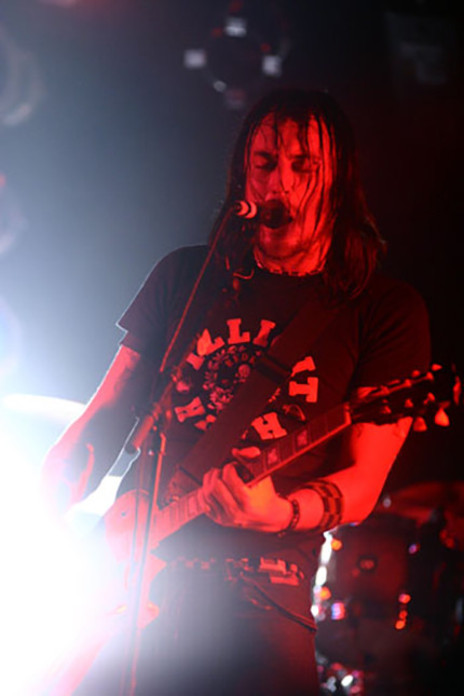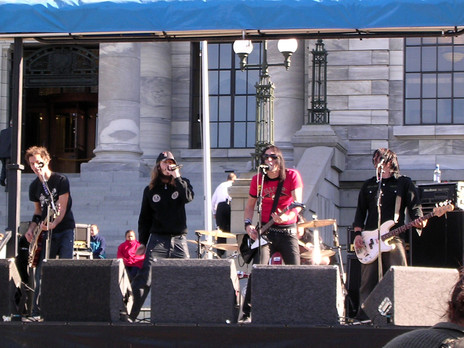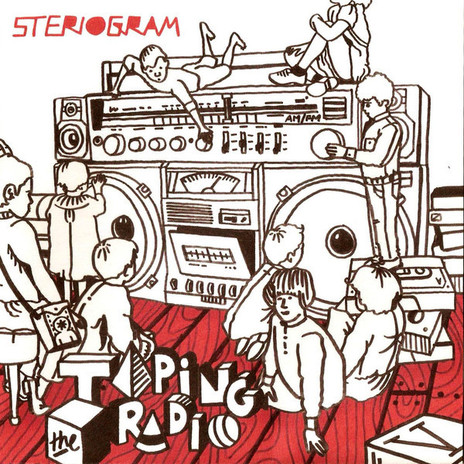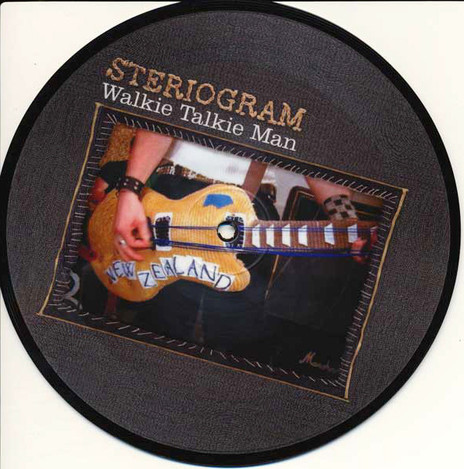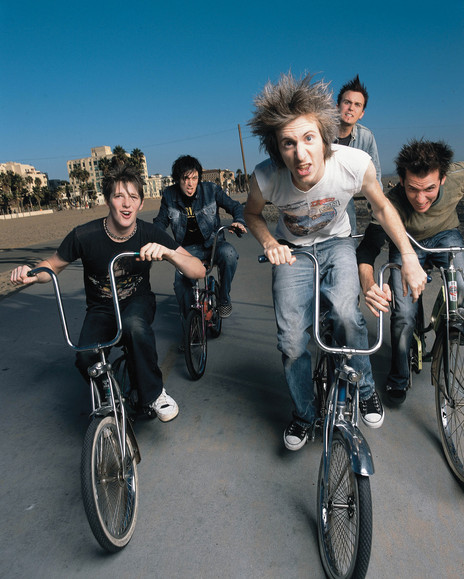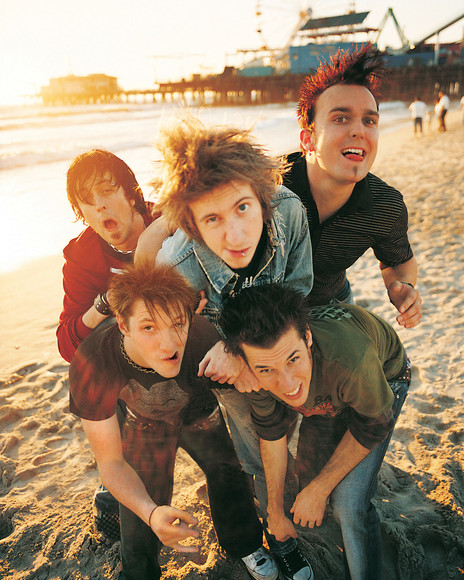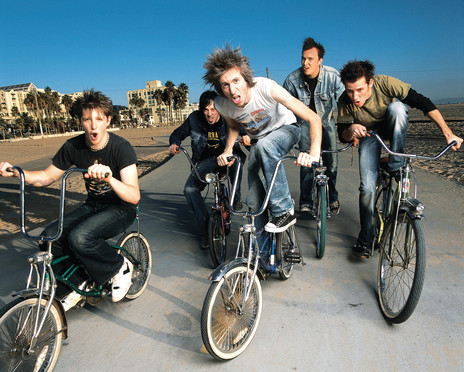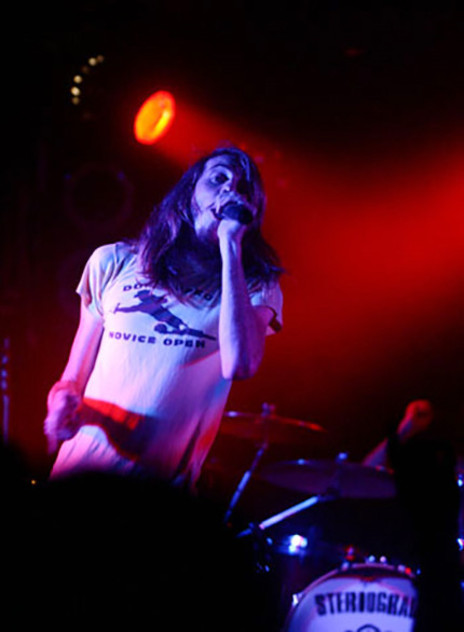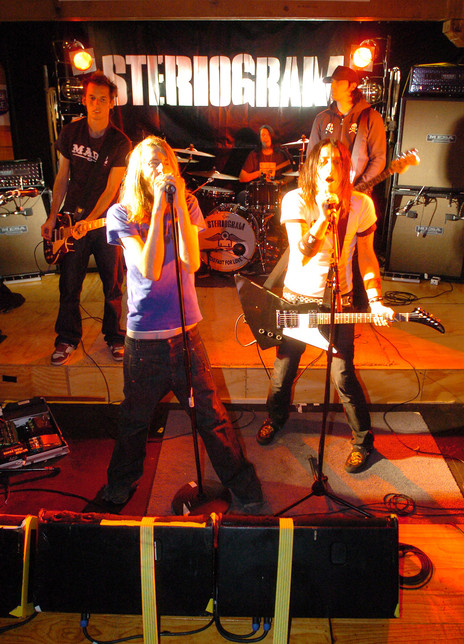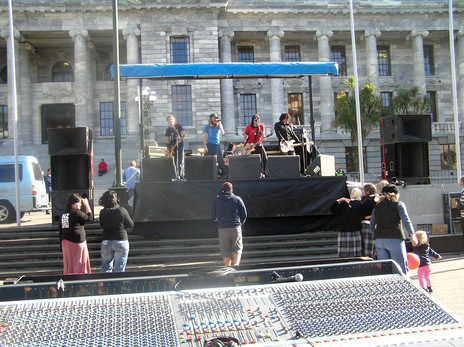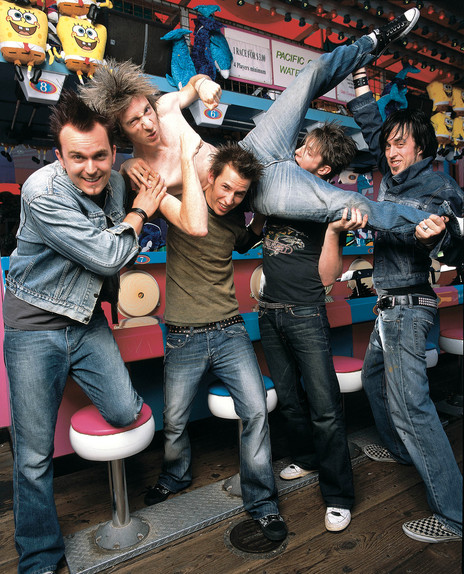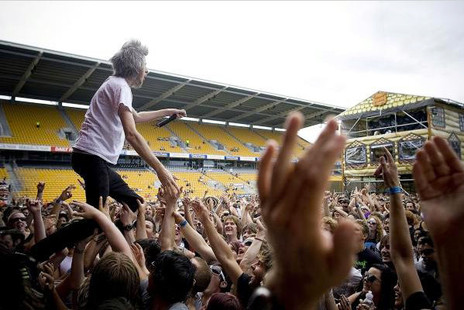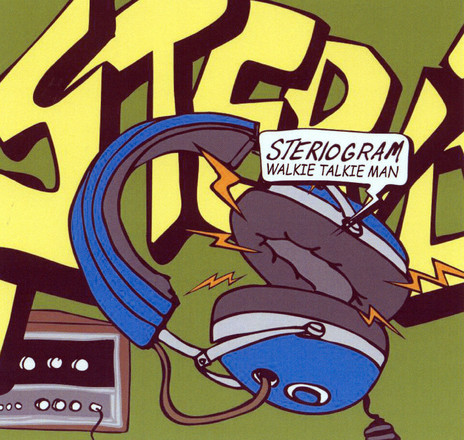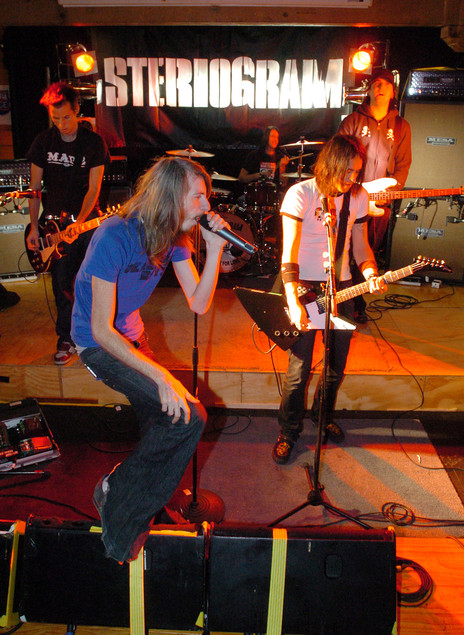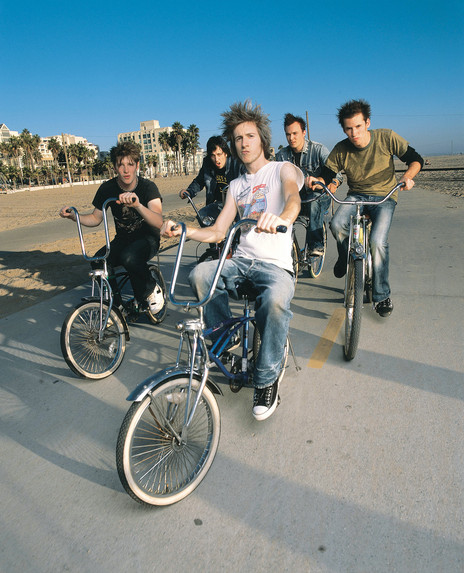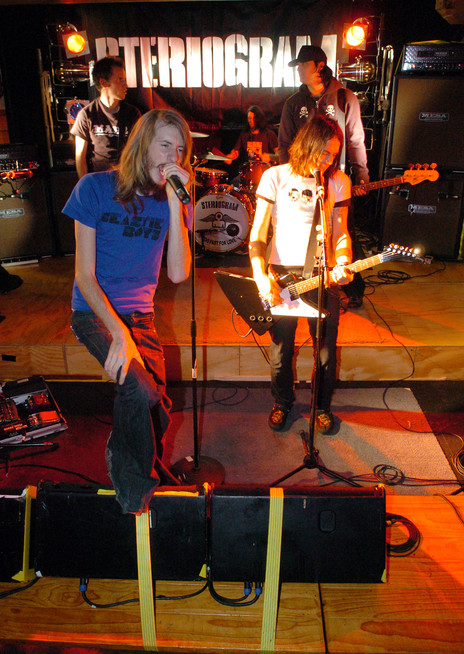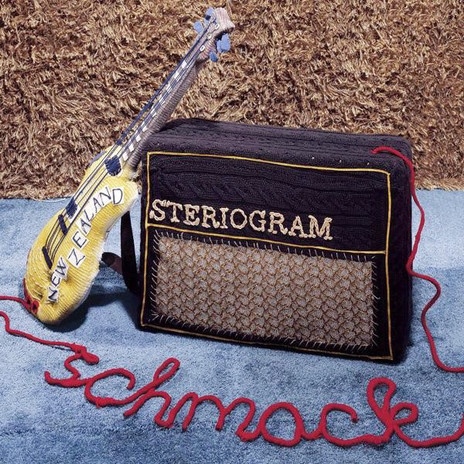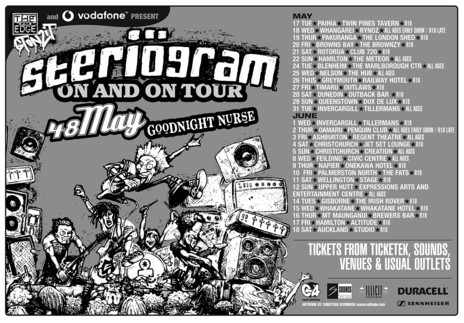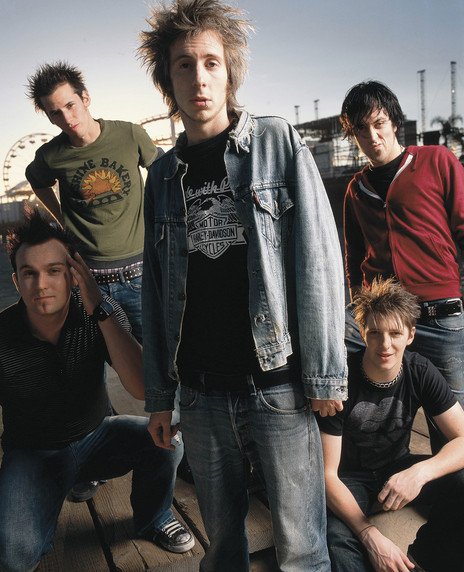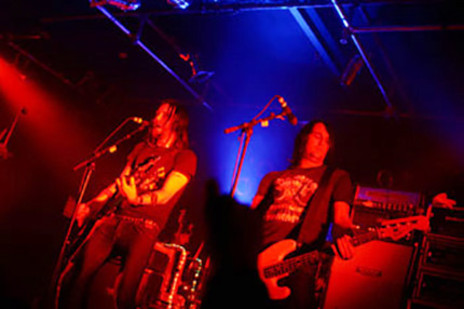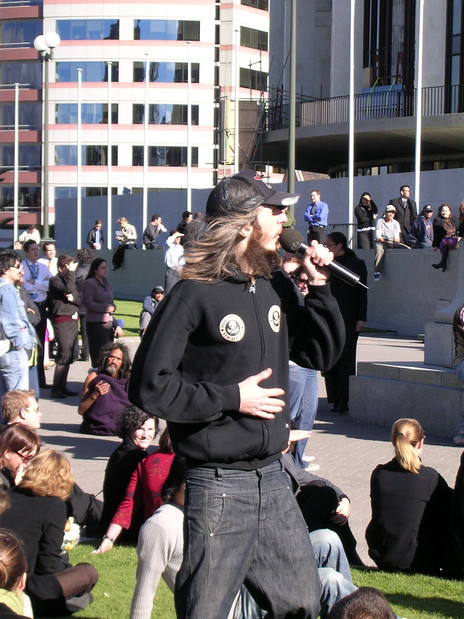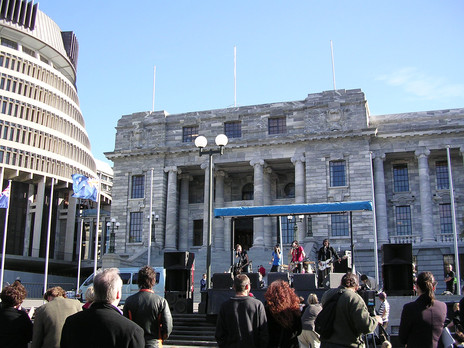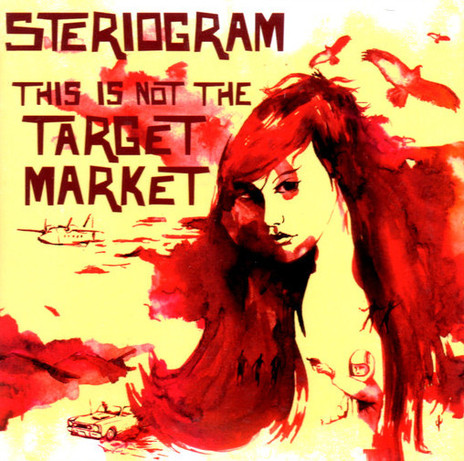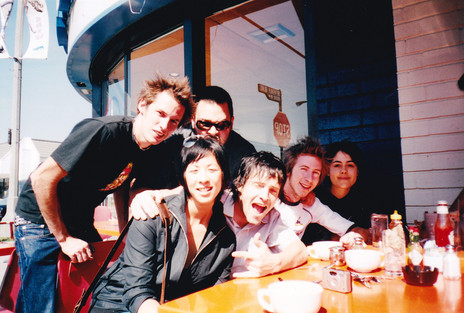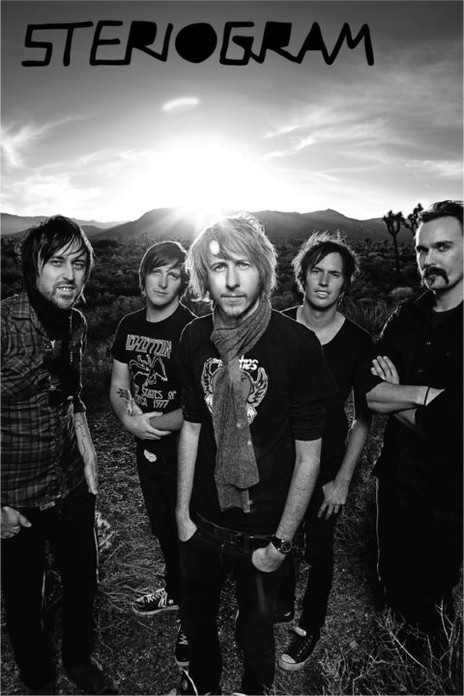They took the band seriously from the get-go. Despite not even having rehearsed together, the three of them made plans to play Parachute, a local Christian music festival. But to get on the bill they needed a band photo for their application and they didn’t even have a bass player. Carter’s solution was to ask Jake Adams, an old friend in Whangarei, to come to Auckland just to be in the photo shoot. He wound up sticking around and joining the band as a permanent member.
With the photo shoot out of the way, the band members sent in their application and headed to their first rehearsal together. They soon got a phone call from someone at Parachute Records wanting to talk to them about a record deal. It was their first-ever rehearsal and they already had an offer from a label. “It was a good omen,” says Carter, “that something was going to happen.”
Steriogram was still a work in progress and the group’s 1999 debut EP Soccerstar wouldn’t do much to move the needle. That all changed in 2001 after Carter wrote the guitar riff to a soon-to-be bogan anthem called ‘White Trash’. The song saw Kennedy exchange his drumsticks for a microphone, laying raps over the top of Carter’s vocals and landing on the punky pop-rap sound that would go on to define their career. With a video for the track shot by Adam Jones – and featuring Westie icon Ewen Gilmour, who agreed to do the shoot for a box of beer – the band was suddenly on the radar.
Steriogram’s tongue-in-cheek approach led some to question just how far they’d go.
Another friend the group met through church, Jared Wrennall, would soon take Kennedy’s place on drums after he moved to vocals full-time alongside Carter. “Tyson was so good on the mic,” says Carter. “He sort of came to life. At that point, I also realised what it was becoming. It wasn't so much going to be my band anymore; it was more like this thing we were going to make together. And it felt right. It felt like this journey we were all meant to do together.”
At the same time, Steriogram’s tongue-in-cheek approach led some to question just how far they would go. Chris Caddick, managing director of EMI at the time, even labelled them a joke band. Later in the group’s career, after signing to Capitol Records (which was owned by EMI – and eventually Universal), they would end up working closely together. “He got really drunk with me one night and apologised for saying that,” remembers Carter. “He didn't see what we had planned, I guess. We didn't know what we had planned either. We were just on this crazy rollercoaster.”
Ever since he was a kid, Carter had dreamed about scoring a record deal and moving to America. “For me it wasn't negotiable,” he says. “It was something we had to do.” But before all that would even become a possibility, the band set out on a school tour in 2002 that saw it play 65 lunchtime concerts over 13 weeks at schools around the country. Steriogram was transitioning out of the church scene and had some real momentum behind it after playing the Big Day Out festival at Auckland’s Mt Smart Stadium – one of the biggest events on the local music calendar at the time. Other bands around town such as Tadpole and Rubicon had played a few school shows and it gave Steriogram an idea to tour schools throughout the entire country.
The band members figured that there was no way the school principals would go for such an idea, so they approached all the music teachers they could and offered to put on a two-hour clinic for their students. In return, they asked to play a lunchtime concert. The idea worked and snackfood company Burger Rings was brought on board as a sponsor. The musicians had no money, Carter remembers. “We were so broke. I remember one time we all shared one latte at a cafe.”
The buzz around The Datsuns and The D4 eventually led to American talent scout Joe Berman sniffing around to see what other local acts there were out there. He found the video for ‘White Trash’ online and emailed Carter to ask if he had any more new music he could take a listen to. With the help of Carter’s girlfriend, the band had been making videos from the school tour with iMovie on their Apple PowerBook G4 (an early version of a MacBook Pro which had set them back an absurd $11,000 at the time). They put together one of the videos to send to Berman with a demo of a catchy new track that the band had recorded during the sessions for their second EP Sing The Night Away. ‘Walkie Talkie Man’ would be the breakthrough they had been waiting for.
There was immediate interest in the band from Maverick Records, who at the time had Madonna, Deftones and Alanis Morissette on its roster. But in the end the deal didn’t happen. One day out of the blue, five weeks later, Carter got a phone call from Berman. “He said ‘Are you sitting down?’” recalls Carter. “And I was like ‘No.’ He said ‘Sit down, Andy Slater from Capitol Records wants to sign your band tonight.’ Within 24 hours the deal was done. Less than three weeks later, Steriogram touched down in America.
‘Walkie Talkie Man’, featuring some rapid-fire wordplay from Kennedy, was selected as the first single.
Schmack!, their 2004 debut album, was recorded with David Kahne, the producer behind records from Paul McCartney, Stevie Nicks and Tony Bennett (whose MTV Unplugged album that Kahne produced won the Grammy for Album of the Year in 1995). A lot of opportunities opened up for the band once it arrived in the US, but they wouldn’t come cheap. The band spent $550,000 recording Schmack! and expectations were high.
The bratty ‘Walkie Talkie Man’, featuring some rapid-fire wordplay from Kennedy, was selected as the first single and the band reached out to Spike Jonze to direct the music video for it. Jonze was behind the classic video for ‘Sabotage’ by the Beastie Boys, one of the band’s favourites, and he replied saying that he liked ‘Walkie Talkie Man’ but he was in Africa shooting a skate video and would have to say no. Not long after, the band got word that French filmmaker Michel Gondry – director of Eternal Sunshine of the Spotless Mind and music videos for Bjork, Queens of the Stone Age and The White Stripes – wanted to talk with them about taking on the project.
“We were in Oklahoma City and we were at a hotel on a speaker phone, and he called in,” says Carter. “We didn't hear a single word he said; he had a very strong French accent. We were just like, ‘Sounds good, man’. We knew if he did it, it would be amazing. We didn't even know what it was that we agreed to but we just said yes.”
The video would bring Steriogram worldwide exposure, all thanks to Gondry’s inventive use of stop-motion animation which he used to create a world made out of wool. It would also be nominated for a Grammy Award for best short-form music video in 2005 and four MTV Video Music Awards. In the meantime, Steriogram scored a spot as the house band on Last Call with Carson Daly and support slots on tours with Sum 41, Blink 182 and Yellowcard.
After signing with Capitol in 2003, Carter had also sent a fax to Apple CEO and co-founder Steve Jobs. Thanks to iMovie, he wrote, the band had scored a five-album record deal. A week later, Carter got a phone call from Jobs' assistant telling him that Jobs wanted to talk. “He got on the line and said ‘Hey Bradley, it's nice to talk to you. Thanks so much for the note, it really made my week.’”
It also happened to be the same week in 2003 that Apple launched iTunes. “He was super straight-up,” says Carter. “Just a lovely guy excited about enabling artists and that's what we talked about for five minutes or so. And then he goes at the end, just let me know when your album comes out, I want to look after you guys.”
It would turn out to be anything but a false promise. At the next Apple keynote speech, Jobs walked on stage to ‘Walkie Talkie Man’. Apple also sent a request to the band to use the song in an iPod ad that would be aired around the world. “It was so much money,” says Carter. “It was hundreds and hundreds of thousands of dollars.”
‘Walkie Talkie Man’ debuted at No.19 on the English charts.
The money wouldn’t last forever. Steriogram had been all over MTV with ‘Walkie Talkie Man’, but Capitol dropped the ball when it came to getting the song played on US radio which stunted their momentum. So instead, they decided to try their luck in England. The label was against it, so the band took what they had left in their shared bank account and paid for their own radio plugger to do the rounds.
The plan worked and ‘Walkie Talkie Man’ debuted at No.19 on the English charts. Carter recalls, “We went from staying at a hostel in Hollywood – we had sort of come down the journey a bit – to about four or five weeks later when we were in England and we were staying at the Trafalgar Hilton. We were playing Top of the Pops and we had limousines with PlayStations in them.”
The journey would continue with a sold-out tour of England. But despite the success, the band hadn’t lived up to expectations from Capitol. The huge staff turnover also meant that supporters of the group no longer worked there. The band knew that if the label wanted to cut them loose, they would get paid out a lot of money, so they worked their way out of the rest of the deal. “Of course,” says Carter, Capitol “had a really good lawyer and somehow they figured out a way that they didn't owe us any money.”
The band released two more albums, This Is Not The Target Market (2007) and Taping The Radio (2010), but neither would have the impact of the debut – although the band would continue to play packed out shows in countries like Japan and Germany. While Steriogram never officially broke up, the band members all relocated to different cities, with Carter forming a new band called Black English after moving to LA. They regrouped for one final Big Day Out performance in 2011. “The one thing I'm real proud of in Steriogram,” says Carter, “is that we always thought of something and we didn't question it. We just did it.”
